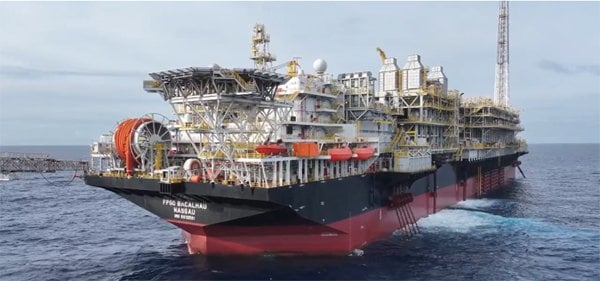World’s Largest FPSO Achieves First Oil at Brazil’s Bacalhau Field

A floating production storage and offloading vessel (FPSO) that is being touted as one of the largest and most modern in the world has achieved first oil production in the Bacalhau field in Brazil. Norway’s energy giant Equinor highlighted that the start of crude flow from the field is a critical milestone in its oil and gas operations in Brazil.
Equinor announced that FPSO Bacalhau achieved its first oil on October 15 at the Bacalhau field, which is the largest offshore field ever developed by the company outside Norway. Located in the pre-salt region of Brazil's Santos Basin in ultra-deep waters exceeding 2,000 meters (more than 6,500 feet), the field boasts recoverable reserves exceeding one billion barrels of oil equivalent.
Following the discovery of crude in the field in 2012 by Brazil’s Petrobras, Equinor took over the operations in 2016. Together with its partners ExxonMobil Brasil, Petrogal Brasil (JV Galp|Sinopec), and Pré-sal Petróleo SA (PPSA), the company is celebrating the commencement of production at the field that is said to represent a new generation of projects that bring together scale, cost-efficiency, and lower carbon intensity.
The 370-meter (1,214-foot) long Bacalhau is deployed approximately 115 miles off the coast of Ilhabela, São Paulo. Permanently moored at a water depth of around 2,050 meters using a spread mooring system, the vessel is designed to produce up to 220,000 barrels of crude oil per day. At a width of 64 meters, it also boasts a minimum crude oil storage capacity of two million barrels, making it one of the largest FPSOs ever delivered to Brazil.

Constructed by Japanese giant MODEC, the FPSO is also designed with a gas turbine combined cycle, a technology that significantly reduces carbon intensity. This will ensure that the field has a CO2 intensity of approximately nine kilograms per barrel, which is half of the industry average. Notably, the company’s innovative M350 hull offers enhanced topside capacity, greater storage than conventional very large crude carriers, and a longer service life.
Equinor is highlighting that it has invested a staggering $8 billion in Bacalhau Phase 1, whose drilling campaign started in 2022 and comprises 19 wells. Over its 30-year lifespan, the field is expected to create around 50,000 jobs and is a reflection of the company’s deep commitment to Brazil´s energy future, which is further underscored by its planned investments of $25 billion by 2030.
The road to first oil has been torturous for Equinor considering that Bacalhau is one of the most complex oil and gas projects in the world due to the characteristics of its reservoir. Apart from being located in ultra-deep waters, the field has a complex carbonate reservoir with a pressure of 900 bar. This makes it the deepest development well drilled for the company to date. Critically, around 70 million hours of work has been recorded in the project with solid safety results.
“The safe start-up of Bacalhau marks a major milestone for Equinor. Bacalhau represents a new generation of projects that bring together scale, cost-efficiency, and lower carbon intensity. With this development, we are strengthening the longevity of our oil and gas production and securing value creation for decades to come,” said Anders Opedal, Equinor President and CEO.
The company contends that Bacalhau will be a major contributor to its goal of generating more than $5 billion of free cash flow by 2030 from its international portfolio. With MODEC as the operator of the FPSO for the initial phase, Equinor plans to operate the Bacalhau facilities until the end of the license period.
The vessel cements MODEC’s dominance in Brazil’s oil and gas sector, owing to the fact that the company has delivered 17 FPSO/FSO vessels to the country. Bacalhau is the ninth FPSO in the pre-salt region, and the company’s first collaboration with Equinor.
